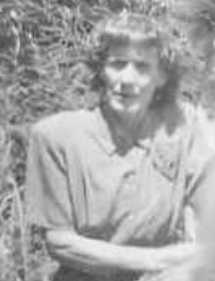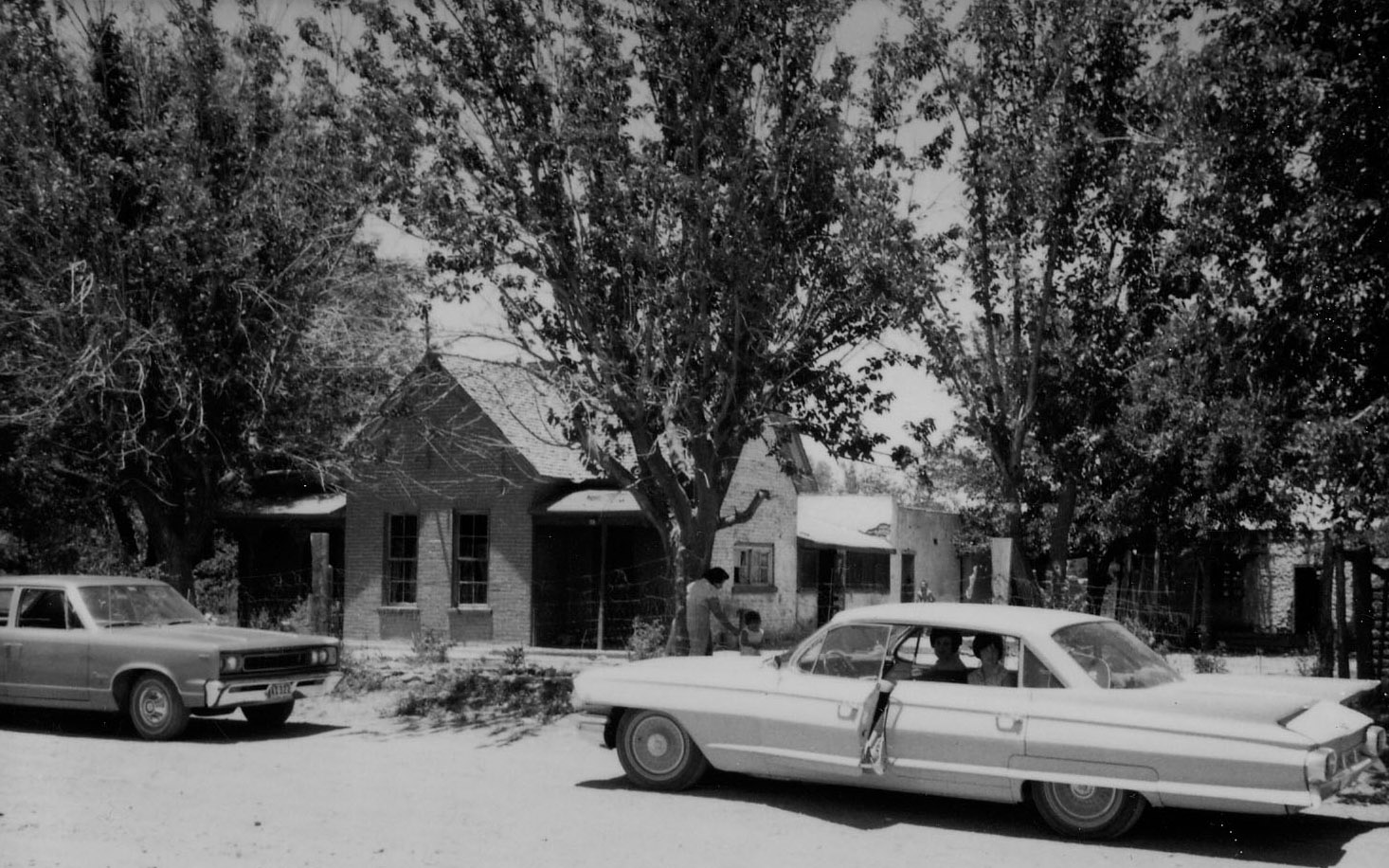
Angela Gavaldón Brown
Born: August 10, 1900 in Jiménez, Mexico
Died: June 20, 1967 El Paso, El Paso, Texas
By her son, Aaron Saul Brown
The following is a brief sketch of the life of Angela Gabaldón Brown as I, her son, Aaron recall these stories.
Angela was born in Ciudad Jiménez, Chihuahua, Mexico, South of the city of Chihuahua on August 10, 1900. Her mother was Maria Holguin, who was a widow of 'Tomas Gabaldón, Angela's father who died Feb 15, 1915. Sometime in her late teens Angela and her mother moved to Ciudad Juárez, the border city to El Paso, Texas. My father lived in a boarding house not far from where on occasion he would go by where mother was having her hair done. Apparently father knew the beautician, because on one occasion at least, he saw mother and without permission gave her a kiss and said something like "Esta guera me gusta" (I like this blonde) while her hair was being fixed. The hairdresser scolded him for the brusque manner in which he did this, chastising him by saying, "this is a decent girl, not like some of the others that you have met here, and you shouldn't do that." Apparently father courted mother to the point that they drove to Las Cruces, New Mexico and were married on the 8th of March 1919. Father had not disclosed his true background, and in fact used a pseudonym when he married her. He later must have amended this fake usage because our birth certificates show his true name as our father.
They must have lived in Ciudad Juárez until 1927 when father was rebaptized into the Church of Jesus Christ of Latter Day Saints and decided to move to Colonia Dublán, Chihuahua. Mother had by then four children: Gustavo born Dec. 17, 1919, Bertha born July 31, 1922, Pauly Jan. 29, 1924, and Aaron July 29, 1925. All four children were born in Ciudad Juárez. They traveled to Colonia Dublán by automobile and the first thing father did was to trade his car for an old house, which he went about repairing immediately. He traded his shotgun for a bag of flour, and that was their start. Father by now was 64 and his body was kind of broken up and could not perform physical labor, but he went about trading this for that and soon obtained a few cows, and later a fan-n. Mother maintained a flock of chickens and pigs and other domestic animals. Father planted fruit trees and a vineyard and some vegetables, and we grew most of what we ate. Mother was tireless. She had one or two women working for her all of the time who helped her care for us and helped with the chores until we were able to be of some help.
Mother joined the church and so did the rest of us when we became of age. She became Relief Society president and father was branch president of the Mexican Branch. Needless to say she was a very busy and active lady, Mary was born 15 June 1927 in Colonia Dublán as well as Heber who was born the 6 of Feb. 1936 and died the same day of asphyxiation. Mother's health began to deteriorate in the early 1940s with the change of life, and had seizures and other bad health, including problems with her vision, until she died June 20, 1967 in El Paso, Texas.
My father Orson P. died on March 10, 1946, but not before seeing Pauly and Bertha married the same day on 18 Jan. 1946, and Aaron having gone to the Mexican Mission in Feb. of 1946. Gustavo and Bertha had both filled missions to Mexico by this time.
Martha is the daughter of Angela's brother Rafael and during a visit to his home in Ciudad Jiménez, Mother heard a little baby crying. She fell in love with the child's cry and begged her brother and his wife to let her adopt little Martha. This was accomplished when Martha was probably 2 years old and Martha came to live with us. Martha was born July 29, 194 1, so mother raised Martha, and Martha became my father's steady companion leading him by the hand when he grew older and more sightless.

Colonia Dublan Home of Orson Pratt Brown and Angela Gabaldon Brown c. 1954
In the summer of 1953 1 had driven my 1952 Belair Chevy Coupe to Colonia Dublán and Gustavo began to tell me about mother's poor circumstances living in that house with Martha and Grandma with no modem facilities and in poor health, and out of the clear blue sky suggested that I drive all 3 of them that same day to El Paso, so that they could live with Mary and Bertha who had a rental home there. I don't even believe we contacted them of our planned escapade, but towards late afternoon we had loaded my car with mother, Grandma, and Martha in the back seat, and one of Gus's workers and I in the front seat and we took off towards Antelope Wells, New Mexico, through muddy roads, high centers, and putting our trust in the Lord to help us through. We arrived at the border after midnight, the gate was closed. I thrust some pesos into the hand of the inspector and convinced him that I had a cargo of sick people and needed to get through at all costs. He yielded and let us through. After crossing into the United States it was required that vehicles should go about a 1/2 mile East and check in at the border agent's home. To have done this would have voided our illegal entry, therefore I proceeded due North until I encountered the Deming, N. Mex. highway and drove on to El Paso, arriving at about 5 o'clock in the morning. Bertha and Mary were truly surprised to see us, but the deed was done, and I proceeded to find a house that I could buy. I had some savings from my Kitchen Craft's commission sales, which I used as a down payment on 5504 Paraguay, a 3 bedroom, I bath home. Gus came up on the train with some of the bottled fruit that mother had left behind. We managed to cross the fruit over and he furnished the money to buy some carpeting and some furniture, and we were in business. The house had a one car garage which I converted to a one bedroom, one bath apartment for my mother before returning to Salt Lake and to continue my cookware sales.
Mary had married John Hayden and by now had Eddie. Bertha had two girls, Lucy born in 1947, and Arlene born in 1948, and they were living with Bertha. Bertha and Mary made the payments on the house and I retained title on the property until 1955 when Mary bought it from me when I was at New York University. Mother took care of Bertha and Mary's children while they worked. I arranged for residence passports for both Mother and Martha. Thereafter mother frequently crossed the border to Juárez to make purchases where she obtained some school books with which she taught Spanish reading and writing to Eddie and Candy. Mother died 20 June, 1967 at the age of 66 in El Paso, Texas.
I will now tell a few of the things that mother was well known for. She gave nicknames to everybody. The son of Manuela, our maid, was Ramon and she called him Ramon Pinzon. These are other ones I remember: Silvestre Gustavo pide un centavo, Bertha Bertina se columpina; Pauly Paulay nalgas por hay; Arones Saules ojos azules, also Nononaso Nononon; Mary was Misis Merri; Martha was Martha Martina. Perhaps Gus, Mary and Martha will remember other nicknames. Mother was always giving nicknames to the neighbors, the Ontiveros, and to everyone we knew.
As children she kept us entertained by telling us stories from Aladdin and the Magic Lamp and many other fables, she also made up some. She told us some about the dumb people who would go about living in the actual life committing all kinds of dumb mistakes, such as: "Three boys said to their father, we want to go into town to learn politics. And so they launched out and when they came to the city limits they ran into a homicide. When they ran into the murderer he asked them who they were and what they were doing, and they said: "We're going into the big city to learn 'politica'(politics)". The murderer told them "I'll teach you 'politica, just remain where you are. Pretty soon some people will come here and will find this dead man and they will ask who killed this man, and you, number 1, will answer very proudly, "Nosotros los senores" (we here did it!). Then the question will be "why?" and the second one is to answer, "Porque quisimos," (because we wanted to). Then the guy will say, "Llevenselos a la carcel", (take them to jail),and the third one will answer "lo merecemos,"(we deserve it).
Another story was that of 3 sisters from the small town who were to go into the city to visit their aunt and their mother coached them as to how to respond properly with good manners when asked if they wanted more food. Their mother said, "Just say, 'muchas gracias, estoy muy satisfecha,' (thank you, I'm very satisfied). "When they found themselves at their aunt's dinner table and they were invited to eat more food, the first one answered, "No, muchas gracias, estoy muy satisfecha," (No, thank you, I'm very satisfied). When the second girl was asked the same question she felt awkward in giving the same answer, so when asked, she responded "No, gracias, estoy muy sadtisfichi" (the same word but with a different meaningless ending). The 3rd girl began to be jittery, "what shall I say," she said to herself. When finally asked she retorted, "No, muchas gracias, estoy muy FIFIRICHI," (which is a nonsensical, meaningless word, but rhymes with the answer given by her second sister). To this day I often tell these and other stories at appropriate times at social gatherings.
Angela worked side by side with our father, as Relief Society president for I believe was 17 years. She became the heart and soul of the Branch and performed much service to the people in the Mexican branch.
Sources:
PAF - Archer Files = Orson Pratt Brown + Angela Gabaldon
Aron Saul Brown
Copyright 2001 www.OrsonPrattBrown.org
|